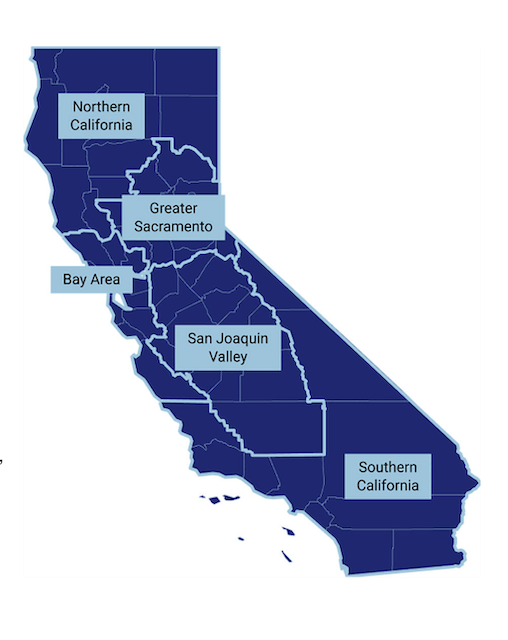
Regional Stay Home Orders will go into effect within 24 hours in regions with less than 15% ICU availability, and prohibits private gatherings of any size, closes most businesses and services except for critical infrastructure and retail, and requires 100% masking and physical distancing in all others.
The order will remain in effect for at least 3 weeks and, after that period, will be lifted when a region’s projected ICU capacity meets or exceeds 15%. This will be assessed on a weekly basis after the initial 3-week period.
Current Developments:
In effect now through the beginning of January, there is a stay-at-home order for SIX BAY AREA COUNTIES.
Alameda, Contra Costa, Marin, Santa Clara, San Francisco & Sonoma (Sonoma County info CLICK HERE)
Although these counties have not necessarily fallen below 15% ICU availability, the health officers in these counties issued a new stay-at-home order requiring some businesses to close and banning all gatherings, as the number of virus cases surge and hospitals fill in those areas. Officials are trying to avoid having hospitals in the region get overwhelmed in the coming weeks as a preemptive safety measure.
 The Five Regions:
The Five Regions:
Northern California: Del Norte, Glenn, Humboldt, Lake, Lassen, Mendocino, Modoc, Shasta, Siskiyou, Tehama, Trinity
Bay Area: Alameda, Contra Costa, Marin, Monterey, Napa, San Francisco, San Mateo, Santa Clara, Santa Cruz, Solano, Sonoma
Greater Sacramento: Alpine, Amador, Butte, Colusa, El Dorado, Nevada, Placer, Plumas, Sacramento, Sierra, Sutter, Yolo, Yuba
San Joaquin Valley: Calaveras, Fresno, Kern, Kings, Madera, Mariposa, Merced, San Benito, San Joaquin, Stanislaus, Tulare, Tuolumne
Southern California: Imperial, Inyo, Los Angeles, Mono, Orange, Riverside, San Bernardino, San Diego, San Luis Obispo, Santa Barbara, Ventura
What Closes:
In any region that triggers a Regional Stay at Home Order because it drops below 15 percent ICU capacity, all operations in the following sectors must be closed:
- Indoor and Outdoor Playgrounds
- Indoor Recreational Facilities
- Hair Salons and Barbershops
- Personal Care Services
- Museums, Zoos, and Aquariums
- Movie Theaters
- Wineries
- Bars, Breweries and Distilleries
- Family Entertainment Centers
- Cardrooms and Satellite Wagering
- Limited Services
- Live Audience Sports
- Amusement Parks
The following sectors will have additional modifications in addition to 100 percent masking and physical distancing:
- Outdoor Recreational Facilities: Allow outdoor operation only without any food, drink or alcohol sales. Additionally, overnight stays at campgrounds will not be permitted.
- Retail: Allow indoor operation at 20 percent capacity with entrance metering and no eating or drinking in the stores. Additionally, special hours should be instituted for seniors and others with chronic conditions or compromised immune systems.
- Shopping Centers: Allow indoor operation at 20 percent capacity with entrance metering and no eating or drinking in the stores. Additionally, special hours should be instituted for seniors and others with chronic conditions or compromised immune systems.
- Hotels and Lodging: Allow to open for critical infrastructure support only.
- Restaurants: Allow only for take-out or pick-up.
- Offices: Allow remote only except for critical infrastructure sectors where remote working is not possible.
- Places of Worship: Allow outdoor services only.
- Entertainment Production including Professional Sports: Allow operation without live audiences. Additionally, testing protocol and “bubbles” are highly encouraged.
The Order does not modify existing state guidance regarding K-12 schools.
The following sectors are allowed to remain open when a remote option is not possible with appropriate infectious disease preventative measures including 100 percent masking and physical distancing:
- Critical Infrastructure
- Non-urgent medical and dental care
- Child care and pre-K

 Live Radio
Live Radio




